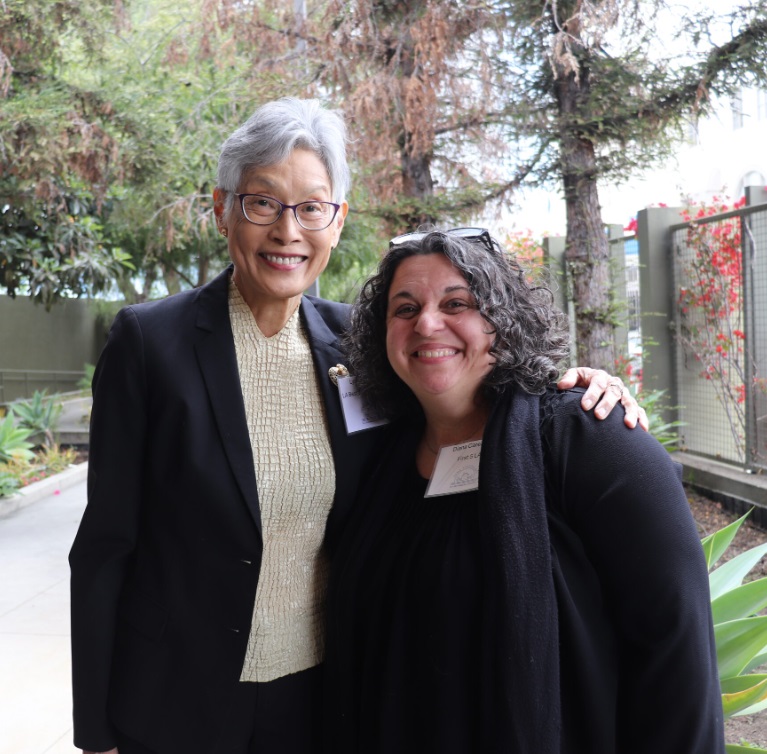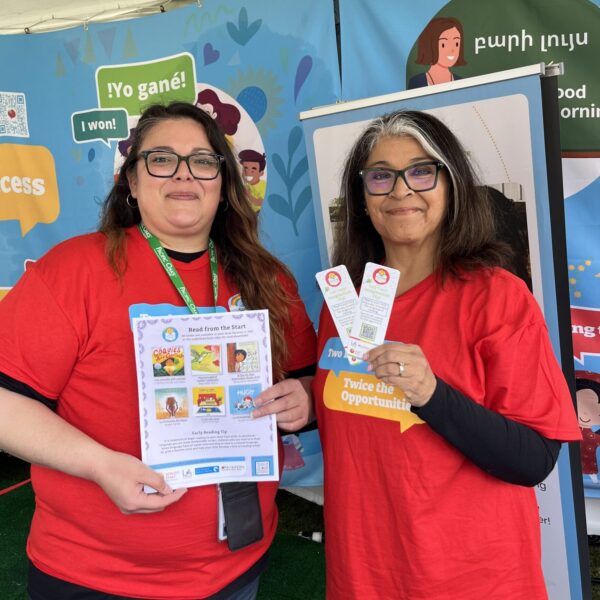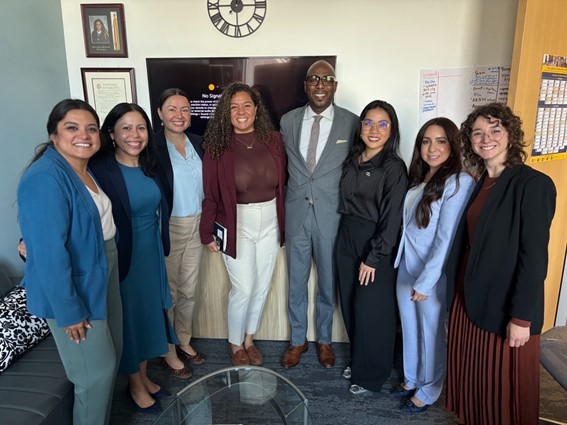April 5, 2021
Autism is a broad range of conditions that influence how a person processes information, their sensory environment and how they interact with other people. While autistic people share some similar characteristics, they are also all different from each other. This is because autism is considered a spectrum, so the combination of autism symptoms varies tremendously from person to person. In fact, two kids with the same diagnosis may look very different when it comes to their behaviors and abilities.
Autism appears in infancy and early childhood, causing delays in many basic areas of development, such as learning to talk, play and interact with others. For children who show early signs, it can make all the difference to get an early diagnosis.
In recognition of Autism Acceptance Month, First 5 LA offers the following information to help parents understand autism and connect them to the resources they need. By recognizing the early signs and symptoms, you can get your child the help they need to learn, grow and thrive.
Signs and Symptoms of Autism in Babies and Toddlers
If autism is suspected in infancy, treatment can take full advantage of the young brain’s remarkable plasticity. Although autism is hard to diagnose before 24 months, symptoms often surface between 12 and 18 months. If signs are detected by 18 months of age, intensive treatment may help learning and communication skills for life.
The earliest signs of autism involve the absence of particular behaviors — not the presence of overt ones — so they can be tough to spot. In some cases, the earliest symptoms of autism are even misinterpreted as signs of a “good baby,” since the infant may seem quiet, independent, and undemanding. However, you can catch certain signs early if you know what to look for.
Early Signs
Your baby or toddler doesn’t:
- Make eye contact, such as looking at you when being fed or smiling when being smiled at.
- Respond to their name, or to the sound of a familiar voice.
- Follow objects visually or follow your gesture when you point things out.
- Point or wave goodbye, or use other gestures to communicate.
- Make noises to get your attention.
- Initiate or respond to cuddling or reach out to be picked up.
- Imitate your movements and facial expressions.
- Play with other people or share interest and enjoyment.
- Notice or care if you hurt yourself or experience discomfort.
If you’re worried that your child has autism, it’s important to seek out a clinical diagnosis. But don’t wait for that diagnosis to get your child into treatment. Talk to your child’s doctor or health care provider about your concerns. Early intervention will improve your child’s chances for overcoming their developmental delays.
Early treatment can reduce the disorder’s effects and help your child thrive in life. Remember, the goal shouldn’t be to “cure” a child whose brain works differently. The goal is to embrace them for their neurodiverse differences and provide the needed support so they can fully participate as members of the community.
Free U.S. Government Services for Children with Autism
Under the U.S. federal law known as the Individuals with Disabilities Education Act (IDEA), children with disabilities — including those with autism — are eligible for a range of free or low-cost services. Under this provision, children in need and their families may receive medical evaluations, psychological services, speech therapy, physical therapy, parent counseling and training, assisted technology devices, and other specialized services.
Children under the age of 10 do not need an autism diagnosis to receive free services under IDEA. If they are experiencing a developmental delay (including delays in communication or social development), they are automatically eligible for early intervention and special education services.
Early Intervention Services (birth through age two)
Infants and toddlers through the age of two receive assistance through the Early Intervention program. In order to qualify, your child must first undergo a free evaluation. If the assessment reveals a developmental problem, you will work with early intervention treatment providers to develop an Individualized Family Service Plan (IFSP). An IFSP describes your child’s needs and the specific services he or she will receive.
For autism, an IFSP would include a variety of behavior, physical, speech, and play therapies. It would focus on preparing kids with autism for the eventual transition to school. Early intervention services are typically conducted in the home or at a child care center.
To locate local early intervention services for your child, ask your pediatrician for a referral or use the resources listed in the Resources section at the end of the article.
Special Education Services (age three and older)
Children over the age of three receive assistance through school-based programs. As with early intervention, special education services are tailored to your child’s individual needs. Children with autism are often placed with other developmentally delayed kids in small groups where they can receive more individual attention and specialized instruction. However, depending on their abilities, they may also spend at least part of the school day in a regular classroom. The goal is to place kids in the “least restrictive environment” possible where they are still able to learn.
Other Services
- California Department of Developmental Services. For children under age 3, call 1-800-515-BABY (2229) and select the “Early Start” extension number. For children between ages 3 and 5, call First 5 California at 1-800-KIDS-025 for screening services and information on whether your child can receive free special needs assessments.
- The Autism Society of America (ASA). The ASA has chapters throughout California and provides information on symptoms and treatments. For more information, visit www.autism-society.org.
First 5 LA’s Partners
First 5 LA is working in partnership with six community-based organizations to increase timely access to developmental screenings and early intervention services. Check out the below L.A. County partners for more information on finding community-based services to help your child with developmental delays:
Allies for Every Child (formerly Westside Children’s Center) provides thousands of at risk children and their families with critical, high-quality early education programs, interventions to strengthen families at risk of abusing or neglecting their children, foster care and adoption services, and a range of vital, integrated services, including developmental screenings/advocacy, parenting classes and pediatric health consultations.
AltaMed Health Services Corporation:
AltaMed Health Services Corporation provides pediatric care, developmental screening and referrals to regional centers and other community supports. AltaMed uses health information technology capabilities to prompt staff in implementing and tracking developmental screening results. Since the launch of the First Connections program in 2014, AltaMed has noted a dramatic increase in their screening rates. After implementing the Hablamos Juntos parent education program in 2017, AltaMed observed an increase in children’s language and communication skills.
Eisner Pediatric and Family Medical Center:
Eisner Pediatric and Family Medical Center is a community health center dedicated to improving the physical, social and emotional well-being of children and families within the communities they serve, regardless of income. Eisner provides several pediatric services including individual and family therapy, trauma-focused cognitive behavioral therapy and parenting programs, among others.
Foothill Family Services supports the San Gabriel Valley and Pomona Valley with family centers in Pasadena, El Monte, South El Monte, West Covina, Duarte and Pomona. To meet the unique needs of this region, Foothill Family staff speak up to 13 languages and provide a diverse array of services for children prenatal to age 5 and their families. In addition to conducting developmental screenings, Foothill Family provides parent education, home visiting services and family therapy, among other services.
Northeast Valley Health Corporation:
Northeast Valley Health Corporation provides comprehensive primary health care to medically underserved residents of L.A. County, particularly in the San Fernando and Santa Clarita valleys. Northeast Valley provides primary and preventive health services to children, including developmental screening and age-specific education regarding child development and growth.
South Central Los Angeles Family Resource Center:
The South Central Los Angeles Family Resource Center supports families of children who are at risk for or have been diagnosed with a developmental disability. The family resource center provides a wide range of services including one-to-one peer counseling support for families and caregivers, ongoing outreach and public awareness in the community, parent support groups and a range of other services.
Children’s Hospital Los Angeles:
As the first and largest pediatric hospital in Southern California and a recognized leader in the field of developmental disabilities, Children’s Hospital Los Angeles provides training, education and technical assistance for the above First Connections grantees.







